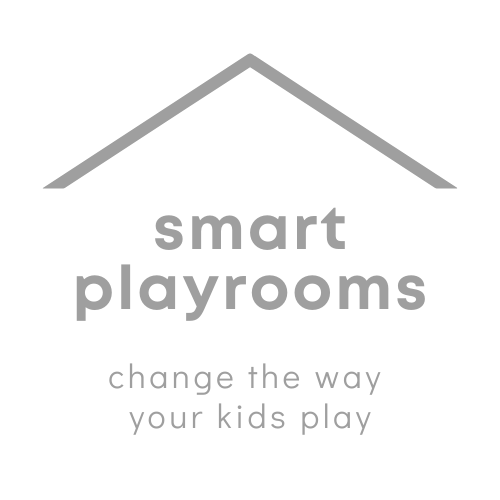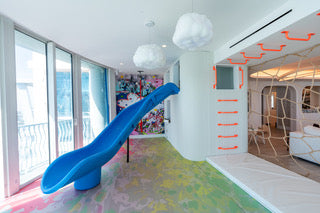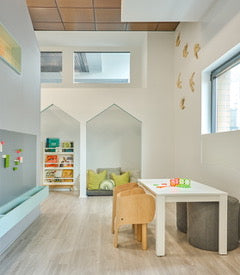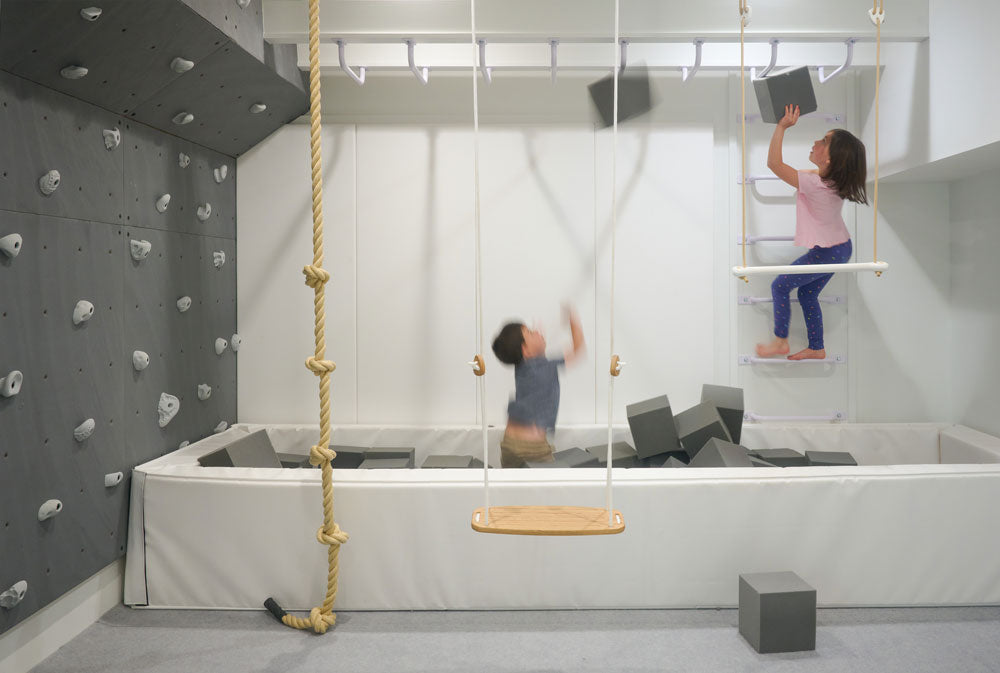Imagine a place where children swing, hang, and soar. The air is filled with laughter as little feet kick into the sky. The benefits of monkey bars go beyond simple fun; they lay a foundation for developing strength, coordination, and courage. To climb is to conquer gravity and, for a child, to touch the very essence of joy and freedom.
At the Project Playroom, our designer monkey bars transform playtime into an exhilarating blend of fun and fitness. Durable, safe, and aesthetically pleasing, our monkey bars serve as the cornerstone of active play. Children engage their imagination and energize their bodies as they swing from bar to bar, mastering their domain one rung at a time.
Enhances Upper Body Strength
Monkey bars are excellent for building upper body strength in children. The act of lifting their entire body weight to swing from bar to bar targets multiple muscle groups. Specifically, the shoulders, arms, back, and chest muscles are engaged and strengthened through regular use. This kind of exercise is important in childhood for developing strong musculature, which is the foundation for many physical activities and sports.
Regularly playing on monkey bars also leads to greater muscle endurance. Over time, kids find they can traverse longer distances and play for extended periods without tiring. This endurance translates to other areas of their lives, making them more active and energetic in general. Improved muscle strength also boosts their metabolic rate, which can help maintain a healthy weight and prevent obesity, an increasing concern in young populations.
Improves Grip and Hand Strength
Grip and hand strength are crucial for daily tasks such as writing, opening containers, and tying shoelaces. As children grip the bars tightly to support their weight, different muscles and tendons in their hands and forearms are activated and strengthened. Such strength can have a positive impact on their dexterity and can enhance their ability to perform fine motor skills.
This increased grip strength can also prevent injuries. Strong hands and wrists can better absorb impacts and are less prone to sprains and strains. Moreover, activities that promote grip strength at an early age could potentially have long-term health benefits, possibly preventing the development of conditions like arthritis and tendinitis later in life.
Develops Coordination and Motor Skills
Spending time on monkey bars also helps with coordination and motor skill development. As children swing from one bar to the next, they learn to coordinate their hand movements with their eye movements. This helps improve their hand-eye coordination, which is valuable for many other sports, such as baseball, tennis, and swimming.
Balance and proprioception, or the awareness of one's body in space, are also greatly improved. As kids navigate the monkey bars, they learn to find their center of gravity and adjust their body position accordingly. These skills are not only essential for everyday activities but also for overall athletic performance. Better balance and coordination can also reduce the risk of injuries from falls, both on the playground and in other life scenarios.
Boosts Confidence and Helps Overcome Fears
Children approach monkey bars with a blend of excitement and apprehension. Successfully crossing from one side to the other requires physical strength and a mental commitment. Each rung reached represents a small victory, a step toward conquering any fears of height or falling they may have. Over time, with every swing and grasp, their self-assuredness blossoms. This boost in confidence extends beyond the playground, as they discover they can face new challenges head-on, armed with the knowledge that they possess the strength to overcome obstacles.
This newfound confidence is a shield they carry into various aspects of their lives. Classroom participation, social interactions, and trying new activities become more manageable. These children are more likely to build courage and take healthy risks. Conquering the monkey bars can be a child's first lesson in resilience, a tangible demonstration that persistence and bravery can lead to success, instilling an attitude that setbacks are merely steps to achievement.
Encourages Problem-solving Skills
Monkey bars also serve as a catalyst for developing problem-solving skills. Choosing the best route across the bars requires quick thinking and strategizing: deciding which bar to reach next, gauging distances, and determining the appropriate moment to let go and swing. With every attempt, children learn to evaluate their approach and make adjustments to navigate successfully from start to finish. This active problem-solving helps enhance critical thinking skills that are valuable in academic settings and everyday situations.
The trial and error involved in mastering the monkey bars also teaches children about perseverance. They understand that not every problem can be solved on the first try, and that's perfectly fine. Each failed attempt is a learning opportunity, guiding them toward more effective strategies for the future. This process hones their abilities to approach problems with a level head and not be deterred by initial setbacks, fostering a tenacious spirit that will serve them throughout life.
Increases Flexibility and Nimbleness
One of the lesser-known benefits of monkey bars is their ability to increase flexibility and nimbleness. Each extension to reach a new rung stretches and elongates muscles, helping to maintain their health and flexibility. Regular play on monkey bars encourages a full range of motion in the arms and shoulder joints, which can help maintain joint function, improve posture, and reduce the risk of injury.
Nimbleness is another natural byproduct of time spent on monkey bars. Children develop the ability to adjust the position of their bodies quickly and with precision in response to changing circumstances. This agility is valuable for children as they engage in other sports and physical activities – from baseball to ballet. The agility gained from playing on monkey bars can even help with non-sport movement skills, like weaving through a crowded school hallway without bumping into others.
Strengthens Core Muscles
Monkey bars aren't only about arms and grips – they also present a solid workout for the core. To swing from bar to bar, children must engage their abdominal muscles to lift their lower bodies and provide the momentum needed. Keeping the body steady during this process requires considerable core strength. Regular play on monkey bars, therefore, helps to build a strong and stable midsection, keeping kids fit and reducing the risk of back injury.
The core is the body's center of gravity and is involved in virtually every move you make, whether it's playing sports or simply walking. A strong core forms a solid foundation for physical development, aids balance and stability, and can improve overall movement efficiency. So, while children are gleefully swinging from rung to rung, they're also fortifying a key muscle group that will benefit them throughout their lives.
Offers Social Interaction Opportunities
Monkey bars also serve as a platform for social interaction among children. Kids cheer each other on, take turns, and often, you'll find them racing each other from one side to the other. Such interaction promotes social growth, teaching them important values such as cooperation, empathy, and fairness. They learn the concept of sharing - that the playground, or life for that matter, is more enjoyable when everyone gets an equal turn.
Through these social interactions, kids develop better communication skills and create childhood bonds that can last a lifetime. They learn how to negotiate, cope with conflict and disappointment, and celebrate victories together. Encouraging your child to socialize on the playground can give them a head start in developing essential social skills that will serve them well throughout their lives. In a very real sense, all that swinging, climbing, and reaching on the monkey bars amounts to reaching for a foundation of physical fitness and life skills.
How Smart Playrooms Can Help
At Smart Playrooms, we understand the challenges of designing a safe and stimulating playroom. With our expertise in creating functional and engaging play spaces, we can help you transform your indoor playroom into a vibrant and inviting environment that sparks joy and fosters creativity. From climbing solutions to personalized design consultations, we offer a range of services to meet your unique needs and preferences. Our team is here to support and help you achieve a vibrant space for your dream playroom. Visit our website to learn more about how we can help you create the perfect playroom for your child.




Leave a comment
This site is protected by reCAPTCHA and the Google Privacy Policy and Terms of Service apply.